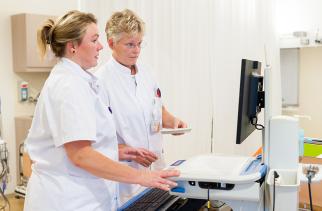Junior researcher (PhD candidate) Professions in Healthcare and Manpower Planning and Nursing Care and Elderly Care
Publicatie
Publication date
Task shifting in Dutch nursing practice: a repeated cross-sectional analysis of nurses' experiences.
Wit, R.F., Veer, A.J.E. de, Groot, K. de, Batenburg, R., Francke, A.L. Task shifting in Dutch nursing practice: a repeated cross-sectional analysis of nurses' experiences. Journal of Advanced Nursing: 2024, p. Art. nr. 16173.
Read online
Aim
This study aims firstly to identify shifts in the execution of medical tasks by nurses in the past decade. Secondly, it aims to explore nurses' perspectives on task shifting: how they think task shifting affects the quality of care, the attractiveness of nursing practice and their collaboration with physicians.
Design
A quantitative repeated cross-sectional study.
Methods
A nationwide survey was conducted among Dutch registered nurses (RNs) working in hospitals and home care, first in 2012 and again in 2022, with sample sizes of 359 and 362, respectively. Analyses were based on descriptive statistics and logistic and linear regressions.
Results
Between 2012 and 2022, there was a significant increase in the execution of only one medical task by nurses, namely prescribing over-the-counter medication. The majority reported in both years that task shifting has positive impact on their professional autonomy and the attractiveness of nursing practice. However, most nurses also reported that task shifting increased their workload (72.7% in 2022) could lead to conflicts in care teams (20.9% in 2022 compared to 14.7% in 2012) and may cause physicians to feel threatened (32.8% in 2022 and 29.9% in 2012). There were no significant changes in nurses' perception of the impact of task shifting on quality of care, the attractiveness of nursing practice and the nurse-physician relationship.
Conclusion
There was an increase in the execution of prescribing over-the-counter-medication by nurses between 2012 and 2022. However, both in 2012 and in 2022, as the majority of nurses reported that task shifting increased their workload, there is reason to worry about this negative consequence of task shifting, e.g. with regard to labour market issues. Further research, also among the medical profession, is needed to better understand and address the implications of task shifting for the nursing profession.
Implications for the profession
Implications for the nursing profession include potential scope expansion with complex tasks, attracting more individuals to nursing careers, although an eye must also be kept on what that means for the workload of nurses and the relationship with physicians.
Impact
Nurse prescribing medicines was more executed in 2022 compared to 2012. Nurses had a predominantly positive perspective on task shifting, but still felt it can cause conflicts in care teams, high workload and physicians feeling threatened. These results can help during implementation of task shifting and in monitoring the perceived effects of task shifting among nurses.
Reporting method
This study followed the STROBE reporting guideline for cross-sectional studies.
Patient or public contribution
No Patient or Public Contribution. This study focussed on the task shifting (perspectives) of nurses.
This study aims firstly to identify shifts in the execution of medical tasks by nurses in the past decade. Secondly, it aims to explore nurses' perspectives on task shifting: how they think task shifting affects the quality of care, the attractiveness of nursing practice and their collaboration with physicians.
Design
A quantitative repeated cross-sectional study.
Methods
A nationwide survey was conducted among Dutch registered nurses (RNs) working in hospitals and home care, first in 2012 and again in 2022, with sample sizes of 359 and 362, respectively. Analyses were based on descriptive statistics and logistic and linear regressions.
Results
Between 2012 and 2022, there was a significant increase in the execution of only one medical task by nurses, namely prescribing over-the-counter medication. The majority reported in both years that task shifting has positive impact on their professional autonomy and the attractiveness of nursing practice. However, most nurses also reported that task shifting increased their workload (72.7% in 2022) could lead to conflicts in care teams (20.9% in 2022 compared to 14.7% in 2012) and may cause physicians to feel threatened (32.8% in 2022 and 29.9% in 2012). There were no significant changes in nurses' perception of the impact of task shifting on quality of care, the attractiveness of nursing practice and the nurse-physician relationship.
Conclusion
There was an increase in the execution of prescribing over-the-counter-medication by nurses between 2012 and 2022. However, both in 2012 and in 2022, as the majority of nurses reported that task shifting increased their workload, there is reason to worry about this negative consequence of task shifting, e.g. with regard to labour market issues. Further research, also among the medical profession, is needed to better understand and address the implications of task shifting for the nursing profession.
Implications for the profession
Implications for the nursing profession include potential scope expansion with complex tasks, attracting more individuals to nursing careers, although an eye must also be kept on what that means for the workload of nurses and the relationship with physicians.
Impact
Nurse prescribing medicines was more executed in 2022 compared to 2012. Nurses had a predominantly positive perspective on task shifting, but still felt it can cause conflicts in care teams, high workload and physicians feeling threatened. These results can help during implementation of task shifting and in monitoring the perceived effects of task shifting among nurses.
Reporting method
This study followed the STROBE reporting guideline for cross-sectional studies.
Patient or public contribution
No Patient or Public Contribution. This study focussed on the task shifting (perspectives) of nurses.
Aim
This study aims firstly to identify shifts in the execution of medical tasks by nurses in the past decade. Secondly, it aims to explore nurses' perspectives on task shifting: how they think task shifting affects the quality of care, the attractiveness of nursing practice and their collaboration with physicians.
Design
A quantitative repeated cross-sectional study.
Methods
A nationwide survey was conducted among Dutch registered nurses (RNs) working in hospitals and home care, first in 2012 and again in 2022, with sample sizes of 359 and 362, respectively. Analyses were based on descriptive statistics and logistic and linear regressions.
Results
Between 2012 and 2022, there was a significant increase in the execution of only one medical task by nurses, namely prescribing over-the-counter medication. The majority reported in both years that task shifting has positive impact on their professional autonomy and the attractiveness of nursing practice. However, most nurses also reported that task shifting increased their workload (72.7% in 2022) could lead to conflicts in care teams (20.9% in 2022 compared to 14.7% in 2012) and may cause physicians to feel threatened (32.8% in 2022 and 29.9% in 2012). There were no significant changes in nurses' perception of the impact of task shifting on quality of care, the attractiveness of nursing practice and the nurse-physician relationship.
Conclusion
There was an increase in the execution of prescribing over-the-counter-medication by nurses between 2012 and 2022. However, both in 2012 and in 2022, as the majority of nurses reported that task shifting increased their workload, there is reason to worry about this negative consequence of task shifting, e.g. with regard to labour market issues. Further research, also among the medical profession, is needed to better understand and address the implications of task shifting for the nursing profession.
Implications for the profession
Implications for the nursing profession include potential scope expansion with complex tasks, attracting more individuals to nursing careers, although an eye must also be kept on what that means for the workload of nurses and the relationship with physicians.
Impact
Nurse prescribing medicines was more executed in 2022 compared to 2012. Nurses had a predominantly positive perspective on task shifting, but still felt it can cause conflicts in care teams, high workload and physicians feeling threatened. These results can help during implementation of task shifting and in monitoring the perceived effects of task shifting among nurses.
Reporting method
This study followed the STROBE reporting guideline for cross-sectional studies.
Patient or public contribution
No Patient or Public Contribution. This study focussed on the task shifting (perspectives) of nurses.
This study aims firstly to identify shifts in the execution of medical tasks by nurses in the past decade. Secondly, it aims to explore nurses' perspectives on task shifting: how they think task shifting affects the quality of care, the attractiveness of nursing practice and their collaboration with physicians.
Design
A quantitative repeated cross-sectional study.
Methods
A nationwide survey was conducted among Dutch registered nurses (RNs) working in hospitals and home care, first in 2012 and again in 2022, with sample sizes of 359 and 362, respectively. Analyses were based on descriptive statistics and logistic and linear regressions.
Results
Between 2012 and 2022, there was a significant increase in the execution of only one medical task by nurses, namely prescribing over-the-counter medication. The majority reported in both years that task shifting has positive impact on their professional autonomy and the attractiveness of nursing practice. However, most nurses also reported that task shifting increased their workload (72.7% in 2022) could lead to conflicts in care teams (20.9% in 2022 compared to 14.7% in 2012) and may cause physicians to feel threatened (32.8% in 2022 and 29.9% in 2012). There were no significant changes in nurses' perception of the impact of task shifting on quality of care, the attractiveness of nursing practice and the nurse-physician relationship.
Conclusion
There was an increase in the execution of prescribing over-the-counter-medication by nurses between 2012 and 2022. However, both in 2012 and in 2022, as the majority of nurses reported that task shifting increased their workload, there is reason to worry about this negative consequence of task shifting, e.g. with regard to labour market issues. Further research, also among the medical profession, is needed to better understand and address the implications of task shifting for the nursing profession.
Implications for the profession
Implications for the nursing profession include potential scope expansion with complex tasks, attracting more individuals to nursing careers, although an eye must also be kept on what that means for the workload of nurses and the relationship with physicians.
Impact
Nurse prescribing medicines was more executed in 2022 compared to 2012. Nurses had a predominantly positive perspective on task shifting, but still felt it can cause conflicts in care teams, high workload and physicians feeling threatened. These results can help during implementation of task shifting and in monitoring the perceived effects of task shifting among nurses.
Reporting method
This study followed the STROBE reporting guideline for cross-sectional studies.
Patient or public contribution
No Patient or Public Contribution. This study focussed on the task shifting (perspectives) of nurses.





